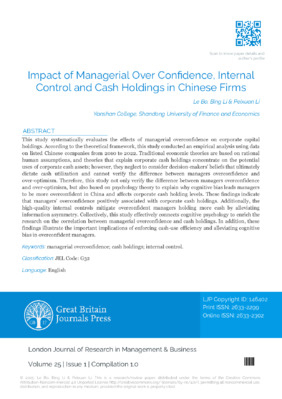Impact of Managerial Overconfidence, Internal Control and Cash Holdings in Chinese Firms
Keywords:
Machine learning, Volatility, Pairs Trading, Clustering Algorithms, cryptocurrencies market, cointegration, algorithmic trading, trading strategies, market efficiency., managerial overconfidence, cash holdings, internal control JEL: G30; G40Abstract
This study systematically evaluates the effects of managerial overconfidence on corporate capital holdings. According to the theoretical framework, this study conducted an empirical analysis using data on listed Chinese companies from 2010 to 2022. Traditional economic theories are based on rational human assumptions, and theories that explain corporate cash holdings concentrate on the potential uses of corporate cash assets; however, they neglect to consider decision-makers� beliefs that ultimately dictate cash utilization and cannot verify the difference between managers overconfidence and over-optimism. Therefore, this study not only verify the difference between managers overconfidence and over-optimism, but also based on psychology theory to explain why cognitive bias leads managers to be more overconfident in China and affects corporate cash holding levels. These findings indicate that managers� overconfidence positively associated with corporate cash holdings. Additionally, the high-quality internal controls mitigate overconfident managers holding more cash by alleviating information asymmetry. Collectively, this study effectively connects cognitive psychology to enrich the research on the correlation between managerial overconfidence and cash holdings. In addition, these findings illustrate the important implications of enforcing cash-use efficiency and alleviating cognitive bias in overconfident managers.
References

Downloads
Published
Issue
Section
License
Copyright (c) 2025 Authors and Global Journals Private Limited

This work is licensed under a Creative Commons Attribution 4.0 International License.





